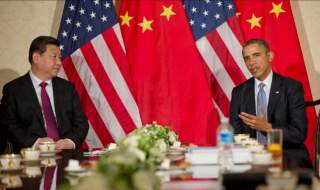Checkmate: China's New Bank Wins Over U.S. Allies
Make no mistake: This is a contest for global supremacy.
Indeed, why was there ever an opening for China to exploit? Together, the United States and Japan control nearly a third of the shares of the Asian Development Bank, which already lends billions of dollars to promote regional development. If American diplomats and planners had moved faster, they could have expanded the ADB’s mission to encompass infrastructure investment and thereby co-opted China’s call to action at the first sign of trouble. China controls only 5.5 percent of the ADB’s shares, so American influence over this infrastructure spending could have been far greater than it will be over the AIIB’s own lending.
Since well before this month’s AIIB imbroglio, the United States has struggled to adapt the institutions over which it holds sway so that their legitimacy might be preserved. In 2010, the United States led a reform effort at the IMF that sought to give emerging economies a better seat at the table, one commensurate with their swelling GDPs. This reform effort was crucial to mitigating a challenge by these countries to the IMF: as the saying goes, he who pays the piper calls the tune, and if increasingly well-heeled states like China and India cannot help call the tune in existing international financial institutions, then they will be motivated to establish their own rival (and more responsive) organizations.
Five years later, the IMF reform process has stalled because the United States cannot seem to act. Congress’s inertia is all the more embarrassing given that the reform will come at negligible cost to either the public fisc or America’s own voting shares. Congress should immediately pass the reform bill in order to undermine the appeal of competing institutions like the AIIB. Even if IMF reform would not dissuade China from putting in place the foundation for a Sino-centric international order, it would make it more difficult for Beijing to sign other countries (like India) up for its project.
By acting too slowly or by refusing to act, successive presidential administrations and Congresses have imperiled the legitimacy of the very institutions that preserve America’s disproportionate influence in the world. Although the IMF and the World Bank are here to stay, their authority could wane as China establishes alternatives and induces other states to join them. Making the best of a bad situation, Washington has now attempted to tie the AIIB closer to the IMF—a step forward, but one that comes too late. In the future, Washington must act far more swiftly or else find itself where it stands today: on the outside, looking in.
Sean Mirski is a third-year student at Harvard Law School, where he is Supreme Court Chair of the Harvard Law Review.
Image: Flickr/U.S. Embassy The Hague

